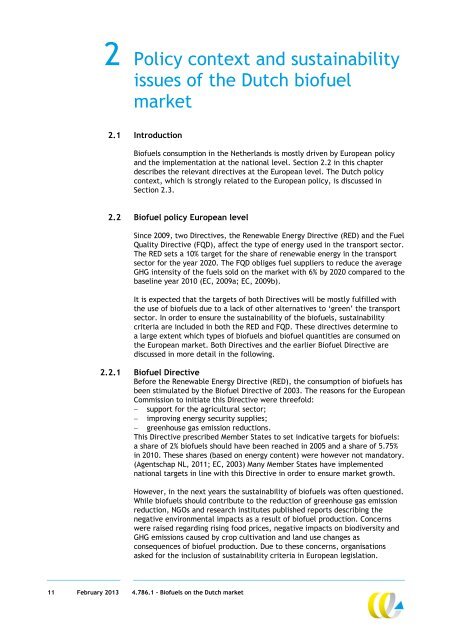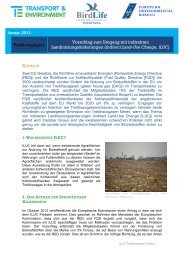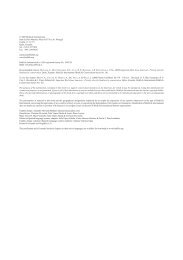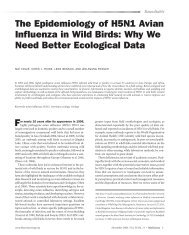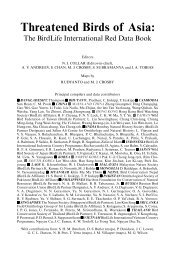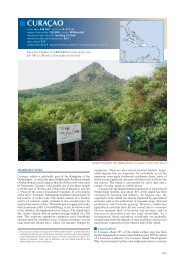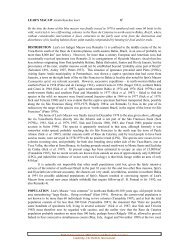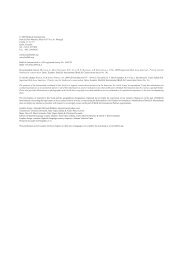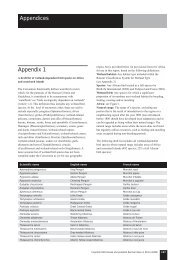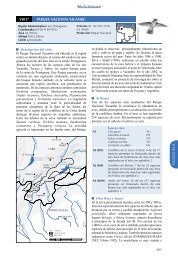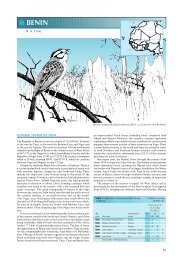Biofuels on the Dutch market - BirdLife International
Biofuels on the Dutch market - BirdLife International
Biofuels on the Dutch market - BirdLife International
Create successful ePaper yourself
Turn your PDF publications into a flip-book with our unique Google optimized e-Paper software.
2 Policy c<strong>on</strong>text and sustainability<br />
issues of <strong>the</strong> <strong>Dutch</strong> biofuel<br />
<strong>market</strong><br />
2.1 Introducti<strong>on</strong><br />
<str<strong>on</strong>g>Biofuels</str<strong>on</strong>g> c<strong>on</strong>sumpti<strong>on</strong> in <strong>the</strong> Ne<strong>the</strong>rlands is mostly driven by European policy<br />
and <strong>the</strong> implementati<strong>on</strong> at <strong>the</strong> nati<strong>on</strong>al level. Secti<strong>on</strong> 2.2 in this chapter<br />
describes <strong>the</strong> relevant directives at <strong>the</strong> European level. The <strong>Dutch</strong> policy<br />
c<strong>on</strong>text, which is str<strong>on</strong>gly related to <strong>the</strong> European policy, is discussed in<br />
Secti<strong>on</strong> 2.3.<br />
2.2 Biofuel policy European level<br />
Since 2009, two Directives, <strong>the</strong> Renewable Energy Directive (RED) and <strong>the</strong> Fuel<br />
Quality Directive (FQD), affect <strong>the</strong> type of energy used in <strong>the</strong> transport sector.<br />
The RED sets a 10% target for <strong>the</strong> share of renewable energy in <strong>the</strong> transport<br />
sector for <strong>the</strong> year 2020. The FQD obliges fuel suppliers to reduce <strong>the</strong> average<br />
GHG intensity of <strong>the</strong> fuels sold <strong>on</strong> <strong>the</strong> <strong>market</strong> with 6% by 2020 compared to <strong>the</strong><br />
baseline year 2010 (EC, 2009a; EC, 2009b).<br />
It is expected that <strong>the</strong> targets of both Directives will be mostly fulfilled with<br />
<strong>the</strong> use of biofuels due to a lack of o<strong>the</strong>r alternatives to ‘green’ <strong>the</strong> transport<br />
sector. In order to ensure <strong>the</strong> sustainability of <strong>the</strong> biofuels, sustainability<br />
criteria are included in both <strong>the</strong> RED and FQD. These directives determine to<br />
a large extent which types of biofuels and biofuel quantities are c<strong>on</strong>sumed <strong>on</strong><br />
<strong>the</strong> European <strong>market</strong>. Both Directives and <strong>the</strong> earlier Biofuel Directive are<br />
discussed in more detail in <strong>the</strong> following.<br />
2.2.1 Biofuel Directive<br />
Before <strong>the</strong> Renewable Energy Directive (RED), <strong>the</strong> c<strong>on</strong>sumpti<strong>on</strong> of biofuels has<br />
been stimulated by <strong>the</strong> Biofuel Directive of 2003. The reas<strong>on</strong>s for <strong>the</strong> European<br />
Commissi<strong>on</strong> to initiate this Directive were threefold:<br />
support for <strong>the</strong> agricultural sector;<br />
improving energy security supplies;<br />
greenhouse gas emissi<strong>on</strong> reducti<strong>on</strong>s.<br />
This Directive prescribed Member States to set indicative targets for biofuels:<br />
a share of 2% biofuels should have been reached in 2005 and a share of 5.75%<br />
in 2010. These shares (based <strong>on</strong> energy c<strong>on</strong>tent) were however not mandatory.<br />
(Agentschap NL, 2011; EC, 2003) Many Member States have implemented<br />
nati<strong>on</strong>al targets in line with this Directive in order to ensure <strong>market</strong> growth.<br />
However, in <strong>the</strong> next years <strong>the</strong> sustainability of biofuels was often questi<strong>on</strong>ed.<br />
While biofuels should c<strong>on</strong>tribute to <strong>the</strong> reducti<strong>on</strong> of greenhouse gas emissi<strong>on</strong><br />
reducti<strong>on</strong>, NGOs and research institutes published reports describing <strong>the</strong><br />
negative envir<strong>on</strong>mental impacts as a result of biofuel producti<strong>on</strong>. C<strong>on</strong>cerns<br />
were raised regarding rising food prices, negative impacts <strong>on</strong> biodiversity and<br />
GHG emissi<strong>on</strong>s caused by crop cultivati<strong>on</strong> and land use changes as<br />
c<strong>on</strong>sequences of biofuel producti<strong>on</strong>. Due to <strong>the</strong>se c<strong>on</strong>cerns, organisati<strong>on</strong>s<br />
asked for <strong>the</strong> inclusi<strong>on</strong> of sustainability criteria in European legislati<strong>on</strong>.<br />
11 February 2013 4.786.1 - <str<strong>on</strong>g>Biofuels</str<strong>on</strong>g> <strong>on</strong> <strong>the</strong> <strong>Dutch</strong> <strong>market</strong>


